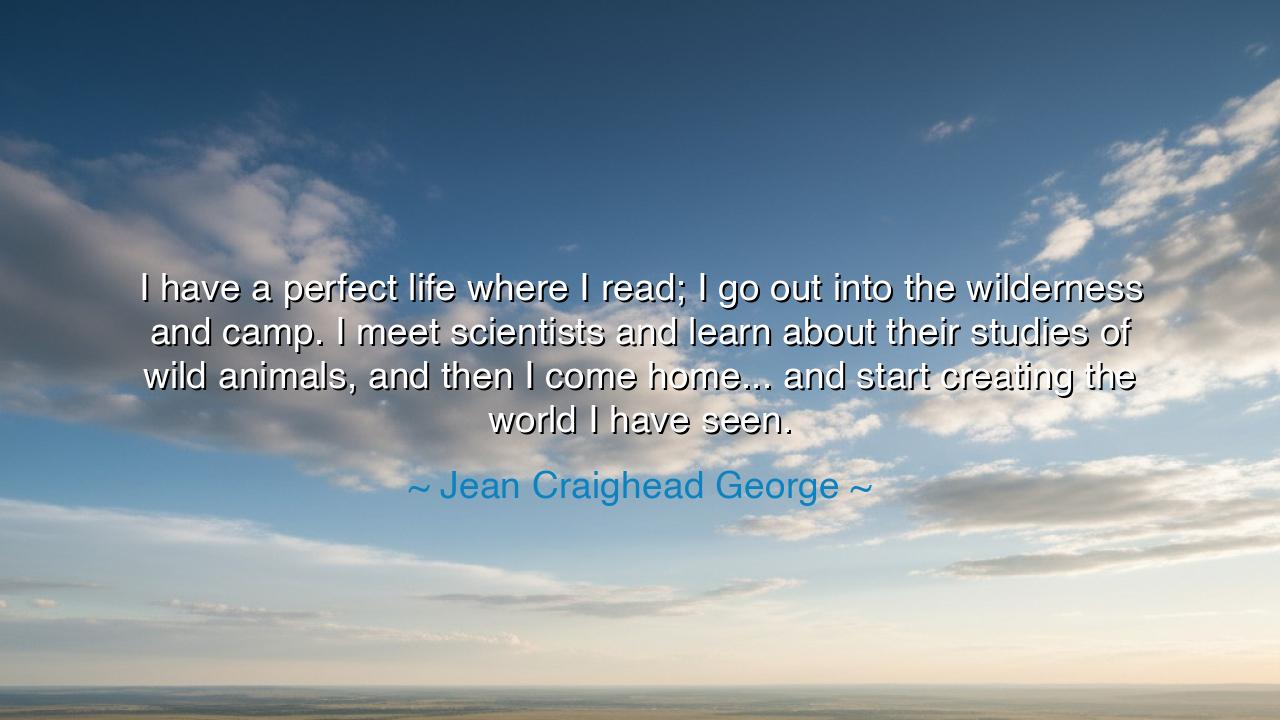
I have a perfect life where I read; I go out into the wilderness
I have a perfect life where I read; I go out into the wilderness and camp. I meet scientists and learn about their studies of wild animals, and then I come home... and start creating the world I have seen.






In the words of Jean Craighead George, the great chronicler of nature and author of My Side of the Mountain, there breathes a hymn to the harmony between knowledge, wonder, and creation: “I have a perfect life where I read; I go out into the wilderness and camp. I meet scientists and learn about their studies of wild animals, and then I come home... and start creating the world I have seen.” In this simple, radiant statement lies the sacred rhythm of a life well-lived — a life not of excess, but of balance; not of power, but of participation in the eternal conversation between the mind and the earth, between learning and living.
Her words are an invocation to a way of being that the ancients would have revered. To read is to commune with the wisdom of the ages; to wander the wilderness is to listen to the living text of creation itself. Between these acts — the seeking of knowledge and the experiencing of truth — lies the alchemy of creativity. For Jean Craighead George did not merely observe the wild; she transformed it into story, giving voice to the silent forests, the whispering rivers, and the unseen flight of falcons. Her “perfect life” is not the pursuit of comfort or acclaim, but the unbroken cycle of curiosity, immersion, and expression — the divine circle of learning, feeling, and giving back.
From the beginning of time, those who have sought wisdom have followed this same pattern. The philosopher Aristotle walked the olive groves of Lyceum to think, for he knew that ideas grow best under the sky. The poet Li Bai of ancient China wandered among mountains and rivers, returning to his desk not with possessions but with poems. Even Leonardo da Vinci, that restless mind of the Renaissance, filled his notebooks with the anatomy of birds and the flight of wind before painting angels that seemed alive. Like Jean Craighead George, they all merged study with wonder, intellect with reverence, and in doing so, created worlds that outlived their mortal years.
Yet in her words there is something more — a return to innocence and humility before nature. The wilderness, in her telling, is not a backdrop but a teacher. To camp beneath its stars is to remember that the earth does not exist for our use alone. She speaks not as a conqueror of the wild but as a student and participant within it. In this humility, her life becomes a mirror of ancient wisdom — for even the sages of the East taught that the greatest truths are not found in temples or courts, but in the quiet companionship of trees, stones, and sky.
Her mention of scientists is equally profound. For she bridges the world of art and science, reminding us that to truly understand life, one must unite the mind of the scholar with the heart of the poet. The scientist studies what is; the artist reveals what it means. When she says she meets scientists and then “creates the world [she has] seen,” she transforms fact into feeling, data into destiny. Her art becomes the echo of truth — a truth first observed through the instruments of science, then reborn through the instrument of the human spirit.
This is the true origin of creation — not from imagination alone, but from communion with reality. The ancients called this the “Great Return,” the cycle by which all wisdom begins in the world, is contemplated by the mind, and is then returned to the world as beauty. It is the same path that guided the prophets, the storytellers, and the explorers who came before. They ventured outward not to escape life, but to understand it — and in coming home, they built bridges between humanity and the eternal.
The lesson, then, is luminous and enduring: to live perfectly is not to escape life, but to engage it fully. Read deeply, for books are the voices of time. Step into the wilderness, for it is the living library of creation. Listen to those who study the world with patience and awe, and then, when your heart is full, create — whether with words, hands, or deeds. Let your art, your work, and your choices reflect the beauty you have witnessed.
And so, dear listener, take this truth to heart: the perfect life is not one of riches or acclaim, but one of balance, curiosity, and reverence. To walk among the trees, to learn from the wise, to return home and give form to what the soul has seen — that is the ancient pattern of greatness. In following it, we too may, like Jean Craighead George, become both student and creator of the world — builders not of empires, but of meaning that will endure long after we have walked back into the wilderness from which we came.






AAdministratorAdministrator
Welcome, honored guests. Please leave a comment, we will respond soon